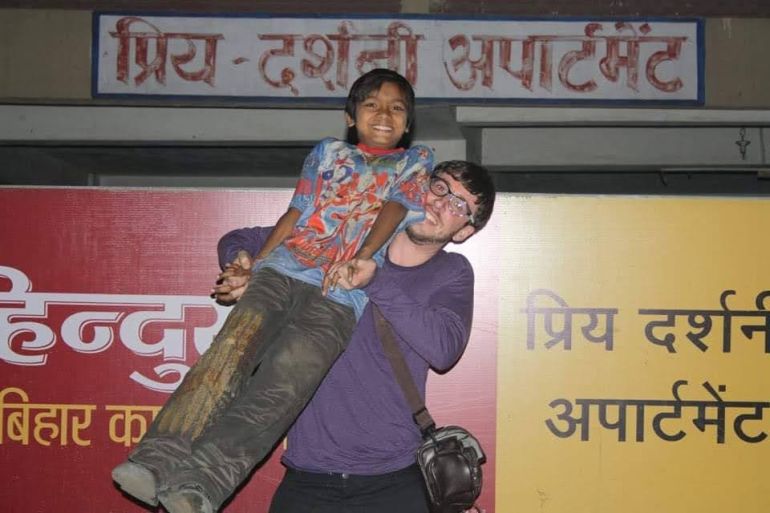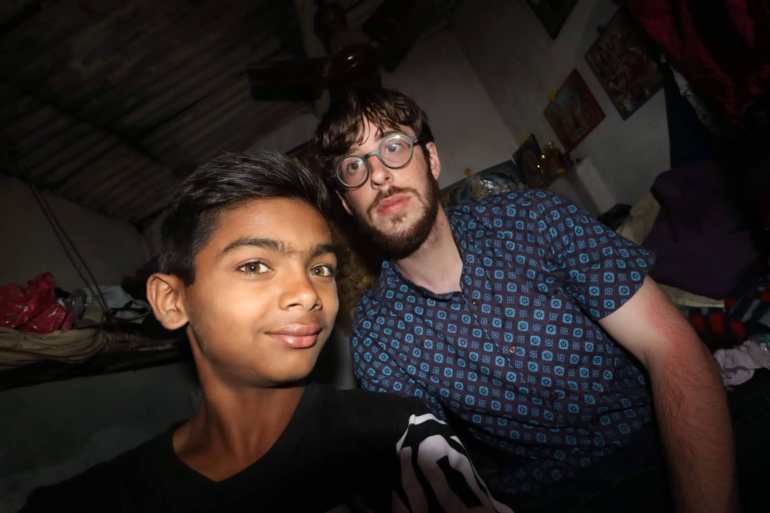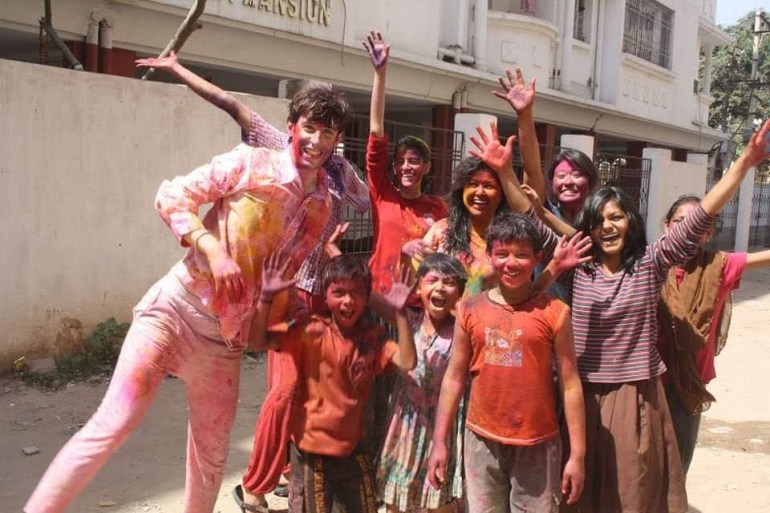An unexpected friendship: A brotherly bond, from France to India
A decade ago, a young French researcher and an eight-year-old Indian boy became friends. Their bond has guided both their lives and work.

Ritik Roushan doesn’t have a specific memory of the first time he met Hugo. “Ask Hugo,” he says, with the confidence that only a friend can have for someone. “He will remember.” And Hugo does.
It was 10 years ago. Hugo Ribadeau Dumas was a 22-year-old student from Paris, on an exchange programme at the Jamia Islamia University in New Delhi, in the final year of his master’s. For his fieldwork in North Indian villages, he wanted to be able to speak Hindi. But Delhi was not helping – one look at him and everyone would proceed to communicate in English. He figured the Hindi-speaking eastern state of Bihar might be a good place for him to achieve his goal. He moved to its capital city of Patna.
Keep reading
list of 4 items‘Accepted in both [worlds]’: Indonesia’s Chinese Muslims prepare for Eid
Photos: Mexico, US, Canada mesmerised by rare total solar eclipse
What is a Godzilla anyway? The 70-year-old monster behind the movies
In the lane leading to his flat, a couple ran an ironing service from their cart. Every day he noticed the couple’s four children conducting their lives there, studying and playing around the cart. The youngest and the most gregarious of the lot was Ritik, eight years old at the time. He and Hugo took to each other instantly.
On his way back home from work, the French student would stop by every evening to chat with the family. “I can’t remember how bad my Hindi was at the time, but it was pretty bad, and they found it amusing. But I was very happy that I had finally found people to have long discussions with,” Hugo said. Ritik would unfailingly walk with him to his building.
Hugo learned that the family’s home was far from the city. They rented a room next to their ironing shop. The room was so tiny that they only went there to sleep. One day Hugo asked Ritik and his sister to study in his flat, instead of sitting by the road. This turned into a daily ritual, which then flowered into something far more enduring than any of them could have imagined.
Ritik and his sister started spending long days at Hugo’s. They were full of questions about the distant land from where he came. What is the food like there? And the people? One day they asked Hugo to sing something in French. No friend of music, Hugo sang the only French song he knew – La Marseillaise, the French national anthem. When Hugo did not have work, they would go on bicycle rides together – Hugo rode the bike; Ritik and his sister rode on the handlebar and pillion. The two kids became his eyes in the city, he their “bhaiyya”, or big brother. Hugo took them out to movies and restaurants, introducing them to the world of pizza and pasta; they brought him home to feed him their mother’s chicken curry.
The neighbourhood watched, amused; sometimes even bemused: how could a white man be friends with a family from the dhobi (washerman’s) caste?
“Some neighbours would taunt us, saying we had trapped a ‘gora’ (a term used in the Indian subcontinent for a white person), but we learnt to ignore them,” Ritik said. “Really?” Hugo interrupted. “I had no idea.” Ritik had purposely kept it from him.
Hugo, too, would notice a crowd gather around the ironing stall when he would stop by to watch Ritik play cricket, or have tea with the family. “It felt like nobody could believe we were friends.”
It’s true that Hugo and Ritik could not have been more different. Racial, cultural and class divides aside, there was not yet a common language. Yet, conversations and laughter flowed easily. With time, Hugo’s Hindi improved. The differences, as it were, also ever-present. For instance, Ritik had grown up believing that alcohol was evil, but when Hugo told him that wine was part of his culture and that it was all right so long as it was consumed in moderation, Ritik grasped the idea that “different” did not mean bad.
When they met, Ritik was too young to understand the meaning of the word “friendship”, but he knew what Hugo meant to him: a big brother, deeply invested in his life. From the outside, though, Hugo was like nobody else Ritik had ever known. “Even though everyone around me was surprised about our friendship, for me it was always easy. Only at the beginning, I thought he was very white. I used to keep pinching the back of his palms to see them turn red,” Ritik said, demonstrating the act for me, before adding that Hugo is “not so white anymore”.
*

When you see Hugo and Ritik together the superficial differences melt away. They laugh, tease each other and share their thoughts freely. Ten years have passed since they first met. Ritik is an adult now. A palpable and playful ease floats between the two as they chat with me via Zoom from Hugo’s apartment in Delhi. They are together for dinner. Over the years, Ritik’s palate has expanded. “I make different things for him. He doesn’t say it if he doesn’t like something, but I can tell.” The night we chat, Hugo has made keema pasta, something he knows Ritik likes.
After his first stint in India, Hugo never really left. He went back home to France now and again, got a bachelor’s degree in Hindi, travelled to other places, but always returned to India. “The first time I was in Delhi I fell in love with India because of the friends I made at Jamia. The second set of best friends I made were Ritik and his family. These two experiences convinced me that I could have meaningful friendships here,” Hugo said. Currently, he is doing his PhD in Delhi. His topic? The transformative power of friendships, or, the role of friendships outside familiar circles in helping people challenge established norms. His focus is on small cities. While he is looking at it mostly from a gender perspective, his proposal was influenced greatly by his young friend.
Inspired by Hugo, Ritik too decided to pursue his undergraduate degree in social sciences. As he transitioned from childhood to adulthood, Hugo and he began to have serious discussions about his future. Anindita, or “Oni didi” (big sister), another friend of Ritik’s, told him to apply to colleges everywhere. “Until then I didn’t think there was a world outside Patna,” he said. With her and Hugo’s help, he prepared his applications. He said he does not know where he would have been in life had his path not crossed Anindita and Hugo’s. When Ritik secured a seat at Delhi University for a Bachelor of Arts degree, he did not think twice. “My parents were also reassured that Hugo bhaiyya was there to look after me,” he said. Hugo occasionally gets calls from Ritik’s mother to check in on him, telling him to make sure her son focuses on his education and does not fall in love, a revelation that makes Ritik laugh.
The college lectures started online last year. In February, in-person classes were to resume. Ritik moved to Delhi and stayed with Hugo until he found accommodation. Hugo and Ritik would set out daily for apartment hunting. Hugo also taught him how to navigate the city, use the metro, read the map and so on, skills Ritik picked up very quickly.
Hugo has always been aware of the inherent imbalance in their status. He is a white man with capital; Ritik is from a so-called lower caste. In the beginning, Hugo was tempted to help the family financially but was very cognisant of how this could skew the balance of their friendship. “I didn’t want to come across as patronising. People in India never forget my skin colour. With Ritik I didn’t want any weight to be there.” Hugo and Anindita now support him financially, a detail Hugo did not mention.
Ritik has great ambitions. He is a gifted photographer, an aspiring actor and radio jockey. “I want to become something for Hugo bhaiyya and Oni didi. I will not let them down,” Ritik told me in a private conversation. Hugo, on his part, keenly follows the developments in his new life. “He has adjusted so well. He has so many friends. He gets along with literally everybody,” Hugo said.
Ritik may have a big circle of friends, but Hugo is the person he turns to the most. After conversations with him, he feels lighter, and the worry of the moment evaporates. Now that Ritik has grown up, Hugo feels that he can start sharing his problems too. “Ritik is a constant reminder that I live in a bubble because I have capital in terms of white privilege and money. I can never take it for granted,” Hugo said.
As with any friendship that has lasted a while, theirs too is laced together by a garland of memories. For instance, they both remember the time Hugo had a birthday party in Patna and because his name was unheard of, the cake was inscribed: Happy Birthday Gogo. Or the time, when Hugo asked Ritik and his sister to help themselves to breakfast and the children finished it, leaving Hugo with nothing when he was hungry. Ritik was consumed with guilt for his thoughtlessness. Then there was that moment early on in their friendship when Hugo, preoccupied with work, scolded Ritik and his sister for making noise. “Don’t you remember,” Hugo asked Ritik while narrating the episode. Ritik shook his head. “That’s unbelievable. I felt so bad after that,” Hugo said.
*

Friendship is a term one often uses loosely in India. Acquaintances, colleagues, neighbours – all categories easily coalesce into this large and generous rubric of human relationships. But the French are less expansive, more precise. “It could have been a little encounter in life that I could have forgotten. But I have no hesitation to use the word friendship – there is a regularity, and it has continued,” Hugo said.
Early on, nobody took their friendship seriously. But after 10 years of sustained mutual sharing and trust, people think differently. Hugo and Ritik know each other’s friends and are inducted into the circles. For Hugo, the friendship has been a testament to his relationship with India. “I believe I am more serious in French, goofy in English and emotional in Hindi. Ritik was the first friend I made in Hindi. This friendship is evidence that I have managed to adapt to India and understand it and root myself here,” Hugo says in English, with emotion but without goofiness. “Friendship offers a mirror to who we are, at least who we aspire to become. With Ritik all my assumptions and notions are constantly challenged. With every discussion I learn something new about the world,” he said.
But above all, theirs is a normal friendship. “We just like to have fun. Ritik is a very spontaneous person and when I am with him, I tend to become spontaneous too. When we cook, he puts on the music and we start dancing. Every time [we part] there is the promise that the next time we meet there will be laughter, fun, ‘masti’.”
When Hugo left Patna after his very first stay, Ritik was distraught. Theirs was the last family Hugo was saying goodbye to. The farewell was dramatic – a little like Ritik was. “It’s time to cry now, mummy, it’s time to cry. Cry now,” he kept telling his mother. It was not a final goodbye after all. Hugo called every now and then and stayed in touch. When in Bihar on work, he would always stop by to spend time with Ritik’s family.
But because the memory of this departure a decade ago is so strongly planted in Ritik’s mind, he is afraid of what might happen when Hugo leaves after his PhD. “I am scared. I am so dependent on him for everything,” he said. It is a claim Hugo does not agree with, taking pride instead in how independent his younger friend really is. After a few moments of silence, Ritik added, “Even if he goes away, I will keep troubling him by keeping in touch. And I know he will be there for me wherever he is.”
This article is part of a new series, Unexpected Friendships, telling the stories of the friendships forged in unlikely circumstances.